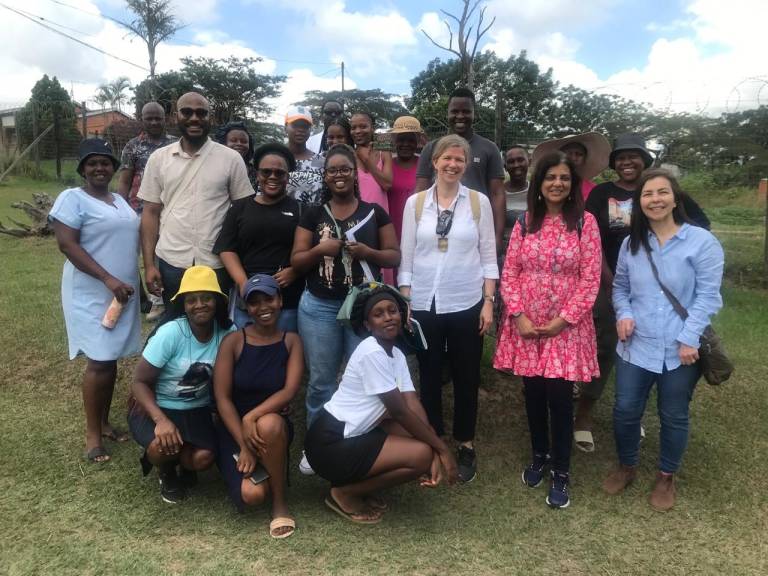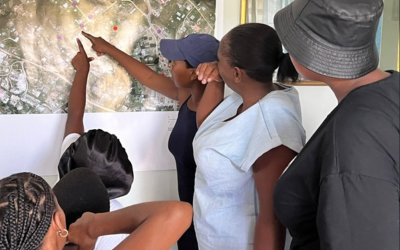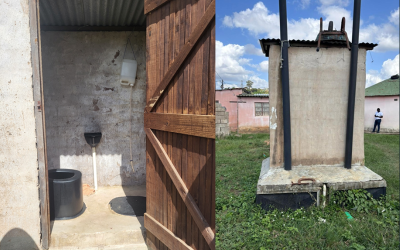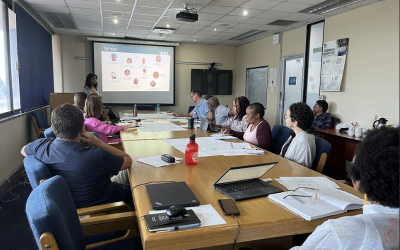UCL Researchers Conduct Fieldwork focused on the SDGs in Durban, South Africa
10 April 2024
A team of UCL researchers recently conducted fieldwork in South Africa as part of a joint project with eThekwinini Municipality focused on developing a Policy Toolkit for selecting sanitation solutions with high impact on the SDGs.

Research Team with uMzinyathi community members (Credit: Anthony Odili)
A team of researchers from UCL recently conducted fieldwork in Durban, KwaZulu-Natal, South Africa as part of a joint project between UCL and eThekwinini Municipality focused on developing a Policy Toolkit for selecting sanitation solutions with high impact on the SDGs. This builds on phase one, which evidenced synergies, trade-offs, and risks between sanitation (SDG 6) and the SDGs.
Prof. Priti Parikh, Prof. Luiza Campos, Dr Pascale Hofmann and Mr Anthony Odili led a series of research activities in the field from 18 - 20 March 2024 with support from research interns from eThekwini Municipality, Minenhle Mbotho, Nomfundo Cele and Sizwe Ndwandwe. On the first day, activities included a visit to Smithfield Informal Settlement, Kenville, Durban, which was followed by a meeting with the Director of Business Development for Kalula toilet, a subsidiary of Loowatt Limited and provider of container-based sanitation in selected settlements of the city.

On March 19, the team conducted a collaborative learning workshop with eThekwini Municipality that was attended by over 20 key stakeholders from diverse professions and sectors in the municipality. Discussions from the workshop provided critical insights towards identifying locally relevant areas for where and how sanitation technologies can contribute to the SDGs.
The research activities also involved a transect walk in uMzinyathi, which is a peri-urban community in a traditional authority area with a dual governance structure, having a local chief and a politically elected ward councillor. This allowed researchers to observe the local environment firsthand and note the sanitation options being used in the community. The transect walk revealed high access to Urine Diversion Dehydration Toilets (UDDTs) but the use of these toilets is hampered by numerous challenges.

The focus group discussion (FGD) that followed engaged with 16 adult female community members from uMzinyathi and provided insights into the sanitation options in use and how they affect different aspects of their everyday living. For one participant, “we don’t use the UDDT anymore because it is a danger to children” and for another, it is a self-preservation act to “avoid the disease you [sic] can contract”. The FGD further clarified what qualities an adequate sanitation facility ought to have, with participants emphasising (menstrual) hygiene, safety, comfort and affordability. Commenting on the FGD, Prof. Priti Parikh said: "The focus group discussions were invaluable, they allowed us to gain a deeper understanding of the community's experiences and perspectives on the UDDTs and the challenges that they pose".

The insights gained from uMzinyathi community members will shape further fieldwork in another four case study areas and be crucial in informing the development of a decision-making toolkit that can help identify appropriate sanitation solutions in eThekwini Municipality with the greatest overall impact for its people, the society, and the environment. The findings of the research are expected to be published in a future academic journal and produced in a policy brief.
Anthony Odili said: "We are grateful to the colleagues from eThekwini Municipality, Nevana Srikissoon, Vishnu Mabeer, and Lungi Zuma-Biyela for their support."
 Close
Close

